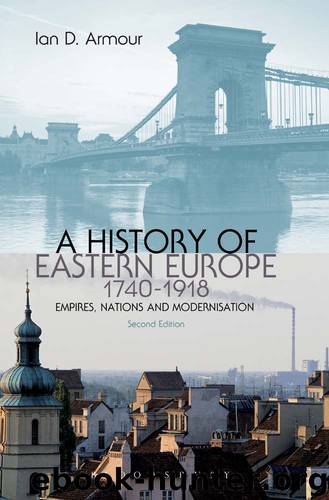History of Eastern Europe 1740-1918 by Armour Ian D.;

Author:Armour, Ian D.;
Language: eng
Format: epub
Publisher: Bloomsbury Publishing
10
The Ottoman Empire and the Balkan Nation-States
The Ottoman imperium in the Balkans rested on a fundamental distinction between Ottoman Muslims and a variety of Christian underclasses. Yet until the eighteenth century the latter were not conspicuously oppressed, save perhaps in time of war with Christian powers. In a pre-nationalist age, the Empire’s multitudinous peoples coexisted without undue friction, as long as the state was administered with reasonable efficiency. It was the institutional degeneration of the Ottoman state, in particular its loss of control over Muslim elites in outlying provinces, which loosened the allegiance of the sultan’s Christian subjects.
The outstanding feature of the Ottoman Empire between 1804 and 1867 is the emergence of autonomous or independent nation-states at its expense. The Serbian revolt of 1804 signalled the beginning of a long process of self-liberation by Balkan Christian peoples, albeit one always heavily dependent on great power intervention. By the end of the 1860s an independent Greece had emerged, and de facto if not formal independence had been achieved by Serbs, Romanians and Montenegrins. The very creation of these states fostered an ever greater nationalist fervour. Not only did the new rulers find themselves driven to promote national sentiment through the apparatus of the state itself; all the new states were ‘incomplete’, in that there were still fellow nationals living under direct Ottoman rule, who must be liberated. This twin agenda of nation-building and national liberation dominated the agenda of the new states.
At the same time the Ottoman Empire had no intention of submitting passively to such a carve-up. Successive sultans wrestled with increasing determination to reverse the Empire’s fortunes. Ottoman reformers, however, continued to be hampered by the conservatism or outright opposition of influential elites; worse, they had to cope with physical revolt against imperial authority, not just by Balkan Christians but also by Muslims. The record of Ottoman modernisation in this period, therefore, is one of well-meaning initiatives frustrated by internal resistance as much as inertia.
Download
This site does not store any files on its server. We only index and link to content provided by other sites. Please contact the content providers to delete copyright contents if any and email us, we'll remove relevant links or contents immediately.
| Africa | Americas |
| Arctic & Antarctica | Asia |
| Australia & Oceania | Europe |
| Middle East | Russia |
| United States | World |
| Ancient Civilizations | Military |
| Historical Study & Educational Resources |
Cecilia; Or, Memoirs of an Heiress — Volume 1 by Fanny Burney(32067)
Cecilia; Or, Memoirs of an Heiress — Volume 3 by Fanny Burney(31463)
Cecilia; Or, Memoirs of an Heiress — Volume 2 by Fanny Burney(31413)
The Secret History by Donna Tartt(18188)
Sapiens: A Brief History of Humankind by Yuval Noah Harari(13994)
Leonardo da Vinci by Walter Isaacson(12809)
The Radium Girls by Kate Moore(11626)
Sapiens by Yuval Noah Harari(5125)
How Democracies Die by Steven Levitsky & Daniel Ziblatt(4966)
The Wind in My Hair by Masih Alinejad(4849)
Homo Deus: A Brief History of Tomorrow by Yuval Noah Harari(4692)
Endurance: Shackleton's Incredible Voyage by Alfred Lansing(4511)
Man's Search for Meaning by Viktor Frankl(4294)
The Silk Roads by Peter Frankopan(4275)
Millionaire: The Philanderer, Gambler, and Duelist Who Invented Modern Finance by Janet Gleeson(4106)
The Rape of Nanking by Iris Chang(4024)
Hitler in Los Angeles by Steven J. Ross(3803)
The Motorcycle Diaries by Ernesto Che Guevara(3789)
Joan of Arc by Mary Gordon(3787)
